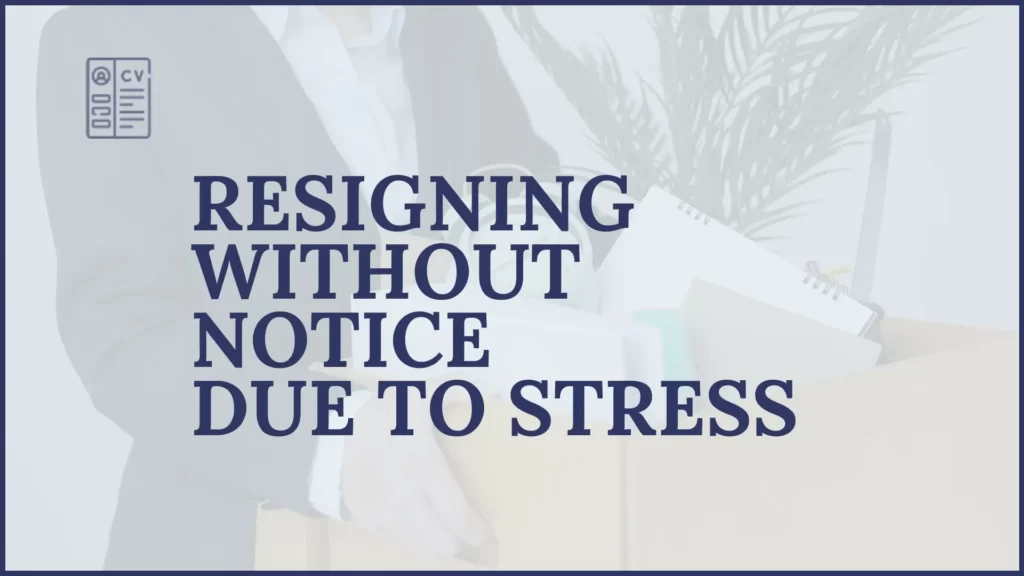Have you ever found yourself in a position where your stress levels at work have become so unbearable that you feel Resigning Without Notice Due to Stress? The decision to resign abruptly due to stress is a serious one and should not be taken lightly. Ignoring the signs of severe stress in the workplace can have serious consequences on your mental and physical health. In this blog post, we will discuss the implications of resigning without notice due to stress, as well as the steps you can take to cope with and alleviate workplace stress before it reaches a breaking point. Also if you want to change your career you can go thorough with our detailed blog.
Key Takeaways:
- Seek professional help: If you are experiencing high levels of stress that are impacting your ability to work, it is vital to seek professional help from a therapist or counselor. They can provide support and guidance to help manage your stress levels.
- Consider the impact: Resigning without notice can have a significant impact on your colleagues and employer. Before making this decision, consider the potential consequences and try to have open communication with your employer about your situation.
- Focus on self-care: Prioritize self-care and take the necessary steps to manage your stress levels. This may involve setting boundaries, practicing mindfulness, and making lifestyle changes to improve your overall well-being.
Understanding Your Rights and Responsibilities

Assuming you are considering resigning without notice due to stress, it’s crucial to understand your rights and responsibilities in this situation. Resigning without notice can have legal and ethical implications, so it’s important to be informed before taking any action.
Legal Aspects of Resigning Without Notice
When it comes to resigning without notice, it’s important to be aware of the legal consequences. In most cases, resigning without notice can be considered a breach of contract, which may result in financial penalties or legal action from your employer. It’s important to review your employment contract and understand the specific terms related to resignation. You may also want to seek legal advice to understand the potential legal implications of your decision.
Ethical Considerations
Resigning without notice can also have ethical implications. Leaving your employer in a lurch can damage your professional reputation and negatively impact your colleagues. It’s important to consider the impact of your actions on others and to communicate your decision as effectively and professionally as possible. Additionally, consider seeking support from a trusted colleague or mentor as you navigate this situation.
Preparing for Resignation
Some people decide to resign from their job without notice due to stress. This decision should not be taken lightly, and it’s important to be well-prepared before taking such a significant step. Here are some things to consider as you prepare for resignation.
Documenting Stress-Related Issues
Before resigning without notice due to stress, it’s important to document the specific issues that have led to your decision. Keep a record of the incidents or situations that have caused you stress and have had an impact on your mental and physical well-being. This documentation will be crucial if you need to provide evidence of the reasons for your resignation in the future.
Assessing Financial and Career Implications
When you resign without notice due to stress, it’s important to assess the potential financial and career implications of your decision. Consider how resigning abruptly may affect your financial stability and future job prospects. It’s also important to evaluate whether leaving your current job will have a positive impact on your mental health and overall well-being.
The Process of Resignation Without Notice
Despite the challenging circumstances, resigning without notice due to stress requires a structured approach. It’s essential to handle the process with professionalism and respect, despite the urgency of your situation. Here are the key steps to navigate this difficult process.
Communicating Your Decision Effectively
When resigning without notice due to stress, it’s crucial to communicate your decision effectively. Schedule a meeting with your immediate supervisor to discuss your resignation in person. Be honest about the reasons that put you on stress like fake rumors, bad behaviors etc, for your decision, and express your gratitude for the opportunities you’ve had at the company. Clearly articulate the impact of the stress on your ability to continue in your role, and emphasize that it’s in the best interest of your health and well-being to resign immediately. Although this conversation may be difficult, maintaining a professional demeanor and being transparent about your reasons for resigning is essential.
Ensuring a Smooth Transition for Colleagues and Employers
Resigning without notice due to stress can leave your colleagues and employers in a challenging position. To help ensure a smooth transition, offer to assist with the handover of your responsibilities and provide any necessary documentation or information that will help ease the transition for your successor. Express your willingness to provide support during the transition period, despite the circumstances of your resignation. This gesture demonstrates your commitment to the well-being of the company and your colleagues, even as you navigate your own challenging situation.
Life After Resignation

For many people, resigning from a stressful job without notice can be a liberating but also uncertain experience. Once you have made the decision to leave, it is important to focus on your well-being, as well as take proactive steps to secure new employment opportunities.
Managing Personal Well-being Post-Resignation
After resigning from a stressful job, it’s crucial to prioritize your personal well-being. Give yourself time to decompress and destress, whether it’s through physical exercise, hobbies, or simply taking time for self-care. Seek support from friends, family, or a therapist if necessary. Additionally, consider setting boundaries and creating a healthy work-life balance as you transition into your next chapter. Remember that your mental and emotional health should be your top priority as you navigate this period of change.
Strategies for Seeking New Employment Opportunities
As you move forward, it’s important to proactively seek new employment opportunities. Update your resume and LinkedIn profile, and start reaching out to your network for job leads and referrals. Consider exploring industries or roles that align with your skills and interests, and be open to exploring freelance or part-time work as you transition. Take the time to research potential employers and prepare for interviews. It’s also beneficial to seek out professional development opportunities to enhance your skills and marketability. Remember that finding a new job may take time, so be patient and persistent in your search.
The Consequences of Resigning Without Notice Due to Stress

The decision to resign from your job without giving notice due to stress can have serious consequences for both your professional reputation and future career opportunities. By not following proper protocol, you risk burning bridges with your current employer and potentially impacting your relationships with colleagues. Additionally, leaving without notice can also reflect poorly on your ability to handle difficult situations and may raise concerns for future employers.
It is important to consider the long-term impact of such a decision and to seek alternative solutions, such as discussing your concerns with your employer or seeking support from a mental health professional, before making a hasty decision that could have lasting repercussions on your career.
Resigning Without Notice Due to Stress FAQ
Q: Can I resign from my job without giving notice due to stress?
A: In certain circumstances, it is possible to resign from your job without giving notice due to stress. However, it is important to carefully consider the potential consequences and seek professional advice before taking this step.
Q: What should I consider before resigning without notice due to stress?
A: Before resigning without notice due to stress, it is important to consider the potential impact on your future employment opportunities, financial stability, and mental health. It is advisable to seek support from a mental health professional and consider alternatives such as taking a leave of absence or exploring workplace accommodations.
Q: How should I communicate my decision to resign without notice due to stress?
A: It is important to communicate your decision to resign without notice due to stress in a professional and respectful manner. It is advisable to have a face-to-face conversation with your supervisor or human resources department and follow up with a written resignation letter outlining the reasons for your decision.
Q: Can I seek legal advice before resigning without notice due to stress?
A: Yes, it is advisable to seek legal advice before resigning without notice due to stress. A legal professional can provide guidance on your rights and potential legal implications of resigning without notice. They can also advise on any potential claims for unfair dismissal or workplace discrimination.
Q: What support options are available after resigning without notice due to stress?
A: After resigning without notice due to stress, it is important to seek support from mental health professionals, support groups, and career counseling services. Additionally, consider exploring options for financial assistance, such as unemployment benefits or disability support. It is important to prioritize your well-being and explore resources that can help you navigate this challenging period.

